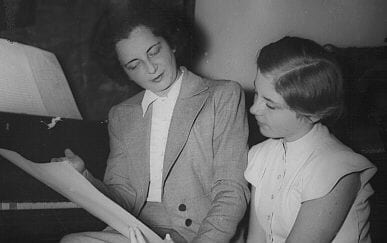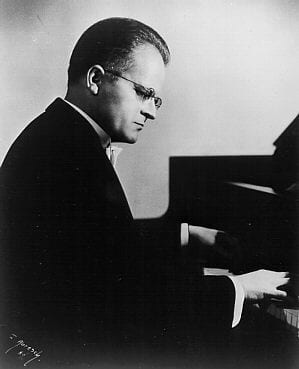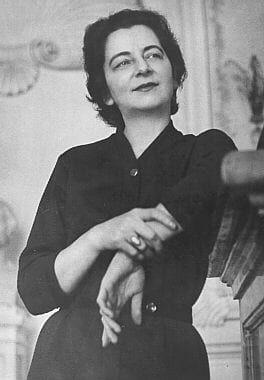edited by Wanda Bacewicz and translated by Wanda Wilk
Excerpts from Letters to Brother Witold (Vytautas Bacevicius)
March 21, 1947 [1]
Since you write so much about your compositions – allow me to say a few words about mine. As you see, Polish composers have long since freed themselves from
Szymanowski’s influence and went different ways. I step quite alone, because I mainly care about the form in my compositions. Because I believe, that if you place things randomly or throw rocks on a pile, that pile will always collapse. So it is that in music there must be rules of construction that will allow the work to stand on its feet. Naturally, the laws need not be old – God forbid. The music may be more simple or more complicated – it is unimportant, it depends upon the language of a given composer, but it must be well constructed. I’m not even referring to good orchestration, that is understood. [or “taken for granted” – translator’s note]. I threw away my old compositions. Now, when I know so much more than before, I see many minuses in my compositions, so why should they exist?

August 14, 1947
If someone were to tell me to resign from my career as violinist I would be only too happy. I play, because it would be unbecoming to stop, because of strength of impetus, and because, well, I earn my living in Poland this way, but I would rather earn less, have peace, sit home and compose. I dream of this.
Of course, when I’m in Paris, there is no way I could compose (I don’t have the time, etc.) and when I travel in Poland concertizing, I can only compose as I pass through, at night time. And that’s not right. (Even so, such works as Wind Quintet, awarded a Prize in 1933, and the suite for piano, were composed in Paris).
August 30, 1947
I have completely lost my cheerfulness. Even though all around me are happy – I just don’t know how. At the most I force myself, so as not to spoil the atmosphere. Still I always put on a cheerful face. Besides this, there is still another thing that makes life a little difficult ( although it is also helpful in a big way). Specifically, I have a completely different tempo of life than anyone else around me. That means, I do everything faster than anyone else, and all who are around constantly annoy me with their slowness. But this also has some good points, like for instance, I am able to write a major work in 2 weeks. Sikorski knows this. Sometimes he asks me, when we meet: “Well, how many symphonies have you written?”
In respect to my child I am very patient (Andrzej says too patient)[2] and completely compliant. I approach her only with love and am bringing her up on love. There’s no question of using any force with Alinka[3] and actually I listen to her, and not the other way around. Despite this, results are very good.
October 23, 1957
(The first part of the letter is missing, in which there is talk about beings on other planets.)[4]
If people would only think about it, they would live happier, better and more pleasant, because when enveloped in their own importance, they lost the happiness of life. From here comes this ambitious struggle for superiority over others. On this premise ( I have a whole theory about it) I acquired an internal peace. I couldn’t care less ever with the greatest… Whether there are any beings or not – surely our worldly matters – in light of the world’s greatness and unriddling infinity – are sh..t, failure. I see myself, as well as others, going back and forth like ants on this, our otherwise interesting and lovely, globe – bustling about supposedly very important matters, while in reality it is always about one thing: #1 about bread, #2 about being first.[5] I understand the first – the other I do not. No one shares my theory. In this case I am weird.
January 23, 1960
People throw up on those who always complain. I’d rather die than to evoke pity in people. No one can know about my worries and problems, and I have “not a few” (…). Even if they did not perform my music, I would still sit in a corner and write, just like I am doing now […] The worst thing in the world is to act on impulse! Only sometimes something happens in this way, but most of the time one only does injustice to oneself.
November 3, 1964
Dear Wituś![9] To entertain you – a report of the chamber concert as seen through the eyes of “children.”[10] Performers: Avramov Bulgarian Quartet (a very good one). They played Mozart, my 4th Quartet – intermission and Brahms. Now, after my quartet there was applause, and they stood and waited for me to come on stage (but they did not know my custom of handling this ceremony). I came out of the rows – rushed on to the stage like a bomb (I always do this) – commotion among the performers (all older gentlemen). I lunged at the first violinist, he moved back with fright, because he thought he would get a slap across the face, meanwhile I kissed him heartily and offered my hand to the others. You have no idea, how funny the children are when they later relate how this looked to them.
November 22,1964
It’s senseless to compare people. (I understood from your letter that Wanda wrote you that I am your opposite). Certainly, there are no identical people, but what does it matter whether we resemble each other more or less. All four of us certainly have certain similar traits. I am probably a little more “independent,” that means I don’t like to accept favors, I don’t like to speak about myself – in my purely personal matters I would like to make my own decisions, although this rarely happens because life is so mixed up. Most importantly – one must look at life with philosophical peace.
February 16, 1966
You predicted Baranowicz’s death in your dream.[11] Only one of my dreams was realized, specifically a number 14 on a streetcar coming towards me. I thought it was referring to Alina’s pregnancy and I kept telling her she would be giving birth on the 14th, meanwhile there was 14 in the announcement of prizes from Brussels ( referring to the Prize from the Belgian government and Gold Medal for the 7th violin concerto at the international competition in Brussels).
November 14, 1966
Music has so transformed itself in the past 20 years, not mentioning the past 40 years, that I, for instance, not only worry when they play my symphonies (luckily, very seldom), but I would never agree to a second edition. I don’t even mention, that I threw away a whole mass of compositions, and I would never permit to have them published or performed.[12]

From Personal Statements and Notes
Notes from the 1960s
- I am constantly keeping track of the development of world music.
- I am an opponent of slavishly holding on to a system, in which a work has been written,
- I see to it that the work serves the composer and not the other way around. Every system is good under the condition that the work is good.
- For me personally the major-minor system is outdated. In order to completely extricate myself from it—I used the serial system in the 4th Quartet, however in very specific ways. Presently I have abandoned this system and am going my own way.
- Goal: to proceed forward in my creativity without losing certain characteristics.
Notes about Pensieri Notturni (1961) [6]
Formation of the piece (work): to present in an organized way something that is disorganized in every way, specifically that which is happening in the mind of a very tired composer.
So, well now, the title Pensieri is strictly speaking not very exact. It would appear, after this disclosure, that it is programmatic music in a sense. But only seemingly so. The composer – I bet, that as a person bestowed with an intuition and sensitivity grater than others – possesses something in his head, a sort of apparatus capable of receiving waves beyond this earth, which the composer receives in a state of great tension. This is no mysticism, but rather physics.
The sound material, which I use in this piece, is not based on any existing system, nonetheless it is strictly assembled by me. The only thing drawn upon – is the non-repetition of sounds. The characteristic feature of the piece – besides everything that happens in it – is the obsessive hold on certain sounds expanding and then narrowing. The composition is to be an exercise in conveying something that the composer is recovering from somewhere else. The text forced me to a special treatment of the instruments, especially the strings.

Excerpts from Other Letters
December 6, 1961
To sister-in-law, Halszka Bacewicz [7]
Maybe you know someone who sells time, because I would like to buy some. I pay well. I have a simple calculation. If I write a half a measure each day, and there are to be 1000 measures, then I would have to write this piece for 6 years, and in six years I will be long united with St.Peter, otherwise it will be worth while for me to offer any price. Should I place an ad?
October 13, 1964
To Tadeusz Ochlewski [8]
I assure you that there is no such person on earth who could force me to do anything, like for instance to talke with a needless debater. I don’t like to make important matters shallow through discussing things that are not altogether professional.
January 5, 1965
To Tadeusz Ochlewski
You write that I don’t sympathize with you. Yes, that’s true. I don’t sympathize with you because that emotion is only good for the weak. I may admire you, but not sympathize. You are the opposite of weakness to me (except for a few moments during the past). To sympathize with someone – is to take away his strength!
From 1965
To Wiesław Moczulski ( French horn player) in Switzerland
Incrustation demands some explanation. Specifically, besides the French horn—the solo instrument—there are only five people: the flute, harp, violin, cello and double-bass. Seldom do we hear the percussion instr.: the gong and two legni, these should be handled by any of the 5 performers accompanying the French horn, that is, by that person who has a pause at that particular moment. This should be determined before distributing the parts. For example, at the beginning of the I movement, the gong should be struck by the flutist or the violinist (this must be written into their part). The part for the harp is quite difficult. In the places marked sul ponticello, the strings must really play sul ponticello – the same applies to the places marked con legno.
Notes
[1]. This selection of excerpts from personal notes and letters of Grażyna Bacewicz was originally published in Polish, as “Z listów i notatek Grażyny Bacewicz” (Ruch Muzyczny Nr. 1, Jan 9, 1994, p. 1, 6). The excerpts were selected and edited by Wanda Bacewicz who added occasional comments about the addressees of letters and the sources of material. Her comments in the headings of the excerpts are placed in italics; the original version of the text had no notes. The notes below are either moved from the longer headings of certain excerpts (signed WB – Wanda Bacewicz), or added by the translator (WW – Wanda Wilk) or the PMJ editor (MAH – Maria Anna Harley).
Grażyna’s brother, Witold, who spelled his name Vytautas Bacevičius, became a leading Lithuanian composer, an emigré in the U.S. where he worked as composer, pianist and teacher (he died in 1970). For more information see Kiejstut Bacewicz: “Mój brat Witold” [My brother Witold] in Marta Szoka, ed. Rodzeństwo Bacewiczów [The Siblings Bacewicz] Łódź: ASTRA 1996, p. 221-239. [MAH] [Back]
[2]. Andrzej Biernacki was Grażyna’s husband. They married in 1936 and had one daughter, Alina; Andrzej died in 1963. He was a doctor of medicine and a scientist, working as a professor of the Medical Academy in Warsaw and the secretary of the Polish Academy of Sciences [MAH]. [Back]
[3]. “Alinka” is a diminutive form of the name “Alina.” Grażyna’s daughter, Alina Biernacka, born in 1942, was five years old at the time that this letter was written. She is now a painter and a poet; one of her paintings adorns the living room of Wanda Bacewicz, hanging above Grażyna’s grand piano [MAH]. [Back]
[4]. Bacevičius had profound interests in life beyond earth, theosophy, gnostic teachings and all manner of esoteric thought. He created a theory of “cosmic music” and tried to apply it in his own work. Cf. Małgorzata Janicka-Słysz: “Vytautasa Bacevičiusa idee ‘muzyki kosmicznej'” [Ideas of ‘Cosmic Music’ by V.B.], in Marta Szoka, ed. Rodzeństwo Bacewiczów, op. cit., p. 185-194; Dana Palionyte: “Próba charakterystyki późnego stylu Vytautasa Bacevičiusa” [An Attempt at Characterizing the Late Style of V.B.] ibidem, p. 195-208 [MAH]. [Back]
[5]. Here, the composer contradicts herself, replacing the “one thing” of self-aggrandizement with two different items by adding the need for “bread-winning” to her short list of people’s most important preoccupations [MAH]. [Back]
[6]. The Italian title of this orchestral work (1960-61) means “Nocturnal Thoughts;” the composer’s better known explanation of the genesis of this piece refers to free associations experienced in the stream of consciousness of a musician at the verge of sleep. This explanation appears in the Program Book of the Warsaw Autumn Festival of Contemporary Music where the sonoristic work was first performed. Bacewicz’s comment quoted here hints at links to “cosmic consciousness” and other ideas dear to her brother, Vytautas [MAH]. [Back]
[7]. Halszka Bacewicz (neé Baranowicz) was the wife of Kiejstut Bacewicz, pianist and professor at the Academy of Music in Łódź [WB]. [Back]
[8]. Tadeusz Ochlewski was the director of the State Music Publishers, PWM Editions and one of the main supporters of Bacewicz’s compositional career [MAH]. [Back]
[9]. “Wituś” – similarly to “Alinka” – is a tender, diminutive form of the name Witold. This form could be used only in reference to little children and in very close, familial relationship. A more common, diminutive form (that could be used by friends and more distant relatives) would be “Witek” [MAH]. [Back]
[10]. Grażyna uses this word referring to her daughter and husband [WB]. [Back]
[11]. Baranowicz was the father-in-law of Kiejstut, their brother [WB]. [Back]
[12]. Grażyna could not counteract that many of the compositions that she did not personally like were reprinted by PWM after her death, e.g. the 3rd Symphony in 1977 and the 1st Cello Concerto in 1978 [WB]. Thanks to the efforts of Wanda Bacewicz and the support of Leszek Polony, the current director of PWM, Grażyna’s early works, such as String Quartet no. 1 are also published by the PWM. The self-critical composer did not want these works to appear in print [MAH].[Back]
The youngest sibling from the artistic family, Wanda Bacewicz (b. 1914) was the only one who did not select the career of a musician. A graduate of the Higher School of Journalism in Warsaw, she has been active as a journalist, broadcaster, writer, and poet for the past 50 years (working for the Polish Radio and a variety of publications). Since her poetic debut of 1958, Wanda Bacewicz penned 10 collections of poems; she also edited a volume of memoirs about Karol Szymanowski and numerous collections of writings by her sister, Grażyna.